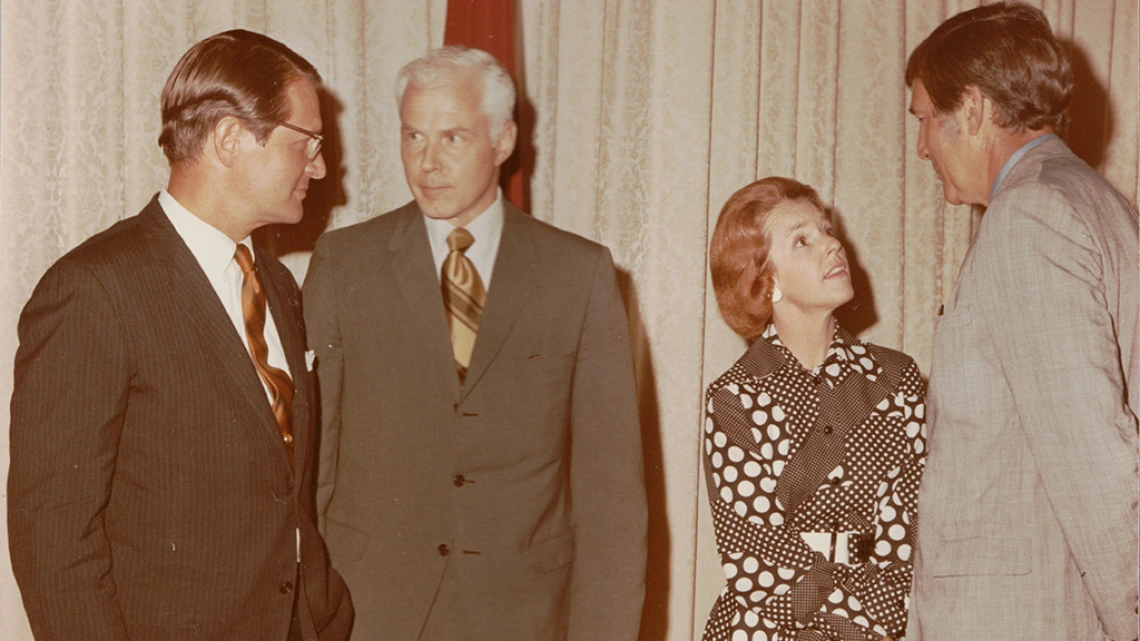Merlin Kearfott DuVal, Jr. papers

Merlin Kearfott DuVal with Morris K. Udall and two unidentified individuals, 1970s (Box 21, Folder 15)
Collection dates: 1954-2007 bulk (bulk 1967-2000)
This collection contains materials which span DuVal’s career beginning with the planning of the UA’s College of Medicine and continuing throughout the rest of his professional life and into his retirement and it is especially rich in materials dating from his time as HEW’s Assistant Secretary for Health (1971-1972). This collection is part of the Arizona Health Sciences Library (AHSL), a collection that focuses on the University of Arzona College of Medicine. It was transferred to Special Collections in 2018. Formerly collection number HT 0008.
Dr. Merlin “Monte” Kearfott DuVal Jr. graduated from Dartmouth Medical School in 1944 and completed his medical degree at Cornell University Medical College in 1946. Following service in the U.S. Navy, he completed an internship at Roosevelt Hospital in New York. A residency at the Bronx Veterans Administration Hospital under Allen Whipple, MD, a pioneer in pancreatic surgery, stimulated DuVal's interest in pancreatic surgery; after joining the surgery faculty at State University of New York in Brooklyn in 1954, he developed an innovative surgical procedure for treating patients with chronic pancreatitis. DuVal was recruited to the University of Oklahoma School of Medicine in 1957 as one of its first full-time faculty members. There he was a professor of surgery and served as assistant director of the University of Oklahoma Medical Center until 1963.
Dr. DuVal arrived in Tucson in January 1964 as founding dean of The University of Arizona College of Medicine. Charged with the task of establishing Arizona's frst MD-degree granting college, he began efforts to raise funds, design the original facility and recruit founding faculty members. Originally called the Arizona Medical Center, the facility was to include the College of Medicine, which admitted its first class in 1967, and the University of Arizona Teaching Hospital, now University Medical Center, which opened to patients in 1971. The same year, the UA College of Medicine graduated its first class and DuVal was nominated to be assistant secretary for health in the U.S. Department of Health, Education and Welfare (HEW). Among DuVal's accomplishments during his tenure in Washington from 1971-1973 he successfully implemented a reorganization of the Public Health Service, the infamous Tuskegee Syphillis Study was ended in 1971 National Cancer Act was enacted.
In 1973, DuVal returned to the UA, where he served as acting dean of the College of Medicine until 1974 and vice president for health sciences until 1979. Following his years with the UA, DuVal was president and chief executive officer in the National Center for Health Education in San Francisco from 1979 to 1982, president and CEO of Associated hopital Systems/American Healthcare Institute of Phoenix and Washington, D.C., from 1982 to 1988; and senior vice president for medical affairs at Samaritan Health Services in Phoenix from 1988 until his retirement in 1990.
Active in his retirement, DuVal urged the establishment of a medical school in downtown Phoenix. The UA College of Medicine-Phoenix opened in October 2006. Over the course of his life DuVal was recognized with nine honorary degrees and fellowships and number awards for scholarship and public community service. At the UA, he was given the UA Bobcats Hall of Fame Award in 1978; the College of Pharmacy's Rufus A. Lyman Community Service Award in 1979; and the College of Medicine Dean's Award in 1987. In 1987, the Arizona Health Sciences Center auditorium was designated "Merlin K. DuVal Auditorium" in his honor. Plans were under way by UA faculty to nominate DuVal for an honorary doctorate.
Dr. DuVal died December 5, 2006.
A collection guide explains what's in a collection. New to using our collections? Learn how to use a collection guide.
Collection guideAccess this collection
Visit us in person to access materials from this collection. Our materials are one-of-a-kind and require special care, so they can’t be checked out or taken home.
How to cite
Learn how to cite and use materials from Special Collections in your research.
